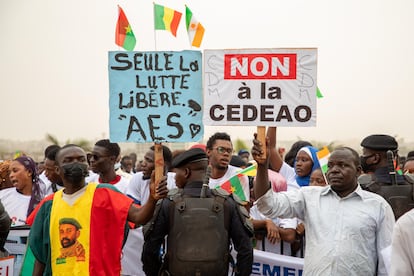Mali, Niger and Burkina Faso’s split with their neighbors dynamites half a century of African integration
The division between ECOWAS and the Alliance of Sahel States heralds a West Africa separated into antagonistic blocs, with different currencies, obliged to understand each other


The withdrawal of Mali, Niger and Burkina Faso from the Economic Community of West African States (ECOWAS), announced on January 28, shatters a long process that began half a century ago of integration, primarily economic, in the West African region, which until now had been widely regarded to be a model for the rest of the continent. It is not only the free movement of goods and people that will be impacted. The break-up heralds a West Africa separated into blocs, according to the clout of external stakeholders such as Russia or the European Union, but nevertheless obliged to understand each other because of their strong economic, cultural and population links. “The ECOWAS as we knew it is over, nothing will ever be the same again,” Abdoulaye Mar Dieye, UN development coordinator for the Sahel, says by telephone. Even the possibility of breaking with the CFA franc and establishing a currency of its own is being considered.
The decision was announced simultaneously on the public television stations of the three countries, which are governed by military juntas that arose from coups d’état, through the release of a joint press release. “They thoroughly master the art of distraction,” believes Gilles Yabi, director of the Senegalese think-tank Wathi. “The announcement of the withdrawal occupies people’s minds and will continue to do so for weeks and months while the repressive measures of the governments toughen (...) and while the discussion on the end of the transitions disappears from the public debate.” All three military regimes announced their provisional capacity and the convening of elections upon taking power, but in Mali and Burkina this transition process has been interrupted and in Niger it is yet to even begin. This reveals the intention of the new leaders to hang on to power beyond the promised timeframe.
After the independence of African countries, particularly in the 1960s, five regional economic blocs were formed. The ECOWAS, established in 1975, comprises the 15 West African nations, although for a short period it also included Mauritania, which withdrew in 2000 to join the Maghreb union. Since its foundation, the organization has promoted regional economic integration and the creation of an area for the free movement of goods and people. This includes the existence of an ECOWAS passport held on a common basis by its citizens. Even with difficulties and challenges in customs harmonization, internal trade has been consolidated over the last half-century.
However, ECOWAS is more than an economic bloc. It possesses a court of justice and has intervened decisively in political and defense and security matters. It has even stepped in with peacekeepers, as was the case in Sierra Leone and more recently in the Gambia in 2017 to force the dictator Yahya Jammeh, who was defeated in the elections, out of the country. “It is not just a matter of trade and economic integration, but of the construction of a regional bloc that could collectively defend the interests of its populations in the long term and represent an influential economic, diplomatic, security, human and scientific hub on a continental level and in its relations with the rest of the world,” explains Yabi.
Room for negotiation
According to ECOWAS’s own legal documents, the decision for the withdrawal of Mali, Niger and Burkina Faso will not come into effect until one year from now, as stipulated in its rules of procedure. This leaves some room for negotiation. “The heads of state have learned from their mistakes, like the tough sanctions against Mali or the threat of intervention in Niger. After the stick, they have realized that it is time for the carrot,” explains Bakary Sambé, director of the Timbuktu Institute. “At the moment there is intense diplomatic activity in order to find a diplomatic solution.”
However, it seems difficult to imagine a return to the current ECOWAS. “History does not move backwards,” insists Dieye. “New forms of cooperation between countries will emerge because they are obliged to understand each other, but the crisis is very profound and the economic repercussions of this decision are enormous,” he goes on to say. Even the monetary union has come into question. Niger, Mali and Burkina Faso share the CFA franc, along with five other countries — Senegal, Ivory Coast, Benin, Guinea-Bissau and Togo. This currency, inherited from the French colonial era and which maintains a fixed parity with the euro, has been strongly disputed by a part of West African civil society. In line with their current policies of rejection of France, the debate on its potential replacement is surfacing within the Sahel countries.
Both Burkina Faso’s president, Ibrahim Traoré, and Niger’s president, Abdourahamane Tchiani, have recently opened a can of worms regarding the potential break with the CFA franc and the creation of a separate currency for the three countries, which could be called the Sahel. The complexity of such a decision is currently hindering their aspirations. For this to be achieved, economists agree that the Sahel states would have to possess sufficient reserves of raw materials to guarantee their stability, the necessary infrastructure to manufacture the new banknotes and a central bank to determine monetary policy. “When the time is right, we will take a decision,” said General Tchiani in a televised interview. Captain Traoré believes this is a necessary step in their process of “cutting all ties with France.”
The momentous decision to withdraw from ECOWAS was taken directly by the heads of state of the three countries. It was not the subject of any parliamentary debate, which could have taken place in the case of Mali and Burkina Faso, where there are representative bodies in the context of the transition, nor was there any consultation with the populations. Last year, the three countries formed the Alliance of Sahel States (AoSS), which is developing as a bloc of its own with Russia’s external support as a new preferred military ally. This is in contrast to ECOWAS, whose members — such as Nigeria, Senegal and Ivory Coast — maintain strategic alliances with the United States and, in particular, with the European Union.
Experts are concerned about the spillover of global tensions between new emerging players and the West to Africa. “Russia, China, Iran or Turkey are taking advantage of the void in the Sahel, where the European Union, preoccupied with other crises, lacks a common strategy. We see Italy moving its laborers, or France, which is still in shock after its expulsion from the three countries,” adds Dieye.
“Do we really want to make our region a breeding ground for violent confrontation by the most antagonistic large, medium and small powers, each of which militarily backs crony leaders who otherwise no longer need any internal legitimacy?” wonders Yabi. “The institutional fragmentation of the region is the genuine threat to the prospects for peace, security and common progress,” he concludes.
Sign up for our weekly newsletter to get more English-language news coverage from EL PAÍS USA Edition
Tu suscripción se está usando en otro dispositivo
¿Quieres añadir otro usuario a tu suscripción?
Si continúas leyendo en este dispositivo, no se podrá leer en el otro.
FlechaTu suscripción se está usando en otro dispositivo y solo puedes acceder a EL PAÍS desde un dispositivo a la vez.
Si quieres compartir tu cuenta, cambia tu suscripción a la modalidad Premium, así podrás añadir otro usuario. Cada uno accederá con su propia cuenta de email, lo que os permitirá personalizar vuestra experiencia en EL PAÍS.
¿Tienes una suscripción de empresa? Accede aquí para contratar más cuentas.
En el caso de no saber quién está usando tu cuenta, te recomendamos cambiar tu contraseña aquí.
Si decides continuar compartiendo tu cuenta, este mensaje se mostrará en tu dispositivo y en el de la otra persona que está usando tu cuenta de forma indefinida, afectando a tu experiencia de lectura. Puedes consultar aquí los términos y condiciones de la suscripción digital.








































